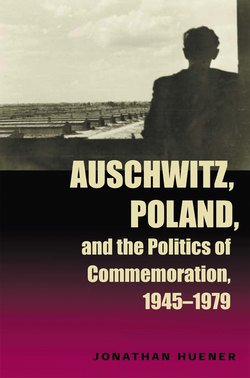Читать книгу Auschwitz, Poland, and the Politics of Commemoration, 1945–1979 - Jonathan Huener - Страница 9
На сайте Литреса книга снята с продажи.
ОглавлениеSeries Editor’s Preface
BEFORE THE SECOND WORLD WAR, Poland was home to a large and thriving Jewish community. By the end of the war, the Nazis had destroyed most of the country’s Jewish population while murdering large numbers of Christian Poles as well. Poland had become a different place, its population decimated, its boundaries changed. Polish “liberation,” meanwhile, had left the country a Soviet satellite.
Poland’s tangled prewar and wartime history complicated the twin post-war tasks of Polish reconstruction and the commemoration of the country’s huge wartime losses. The epicenter of Poland’s wartime catastrophe, the Nazi concentration camp complex at Auschwitz-Birkenau, where both ethnic Poles and Jews had perished, symbolized the horror of Nazism and thus became the focal point for preserving wartime memory. But commemoration proved neither an apolitical nor a neutral act. Poles would bend the memorial site at Auschwitz to the purpose of constructing postwar Polish identity and nationhood. At Auschwitz, the country also would confront what has loomed as perhaps the greatest challenge to the Poles’ national project, the problem—and tragedy—of ethnic Polish-Jewish relations.
Auschwitz, Poland, and the Politics of Commemoration, 1945–1979, by University of Vermont historian Jonathan Huener, offers a balanced, nuanced treatment of this particularly difficult chapter of modern Polish history. A judicious work marked by meticulous research, disturbing descriptions, and keen analysis, Huener’s study lays bare the thinking of the politicians, officials, and museum curators who planned and executed the Auschwitz memorial during the postwar period, when the site successively was transformed, contested, and reinterpreted. In its deftness, nuance, and subtlety, Jonathan Huener’s book comes to us as a model scholarly work that makes an outstanding contribution to the historical literature not only in Polish studies and Jewish studies, but also in the cultural studies field.
Auschwitz, Poland, and the Politics of Commemoration, 1945–1979 is the third volume in the new Ohio University Press Polish and Polish-American Studies Series. The series revisits the historical and contemporary experience of one of America’s largest European ethnic groups and the history of a European homeland that has played a disproportionately important role in twentieth-century world affairs. The series publishes innovative monographs and more general works that investigate under- or unexplored topics or themes or that offer new, critical, revisionist, or comparative perspectives in Polish and Polish-American studies. Interdisciplinary or multidisciplinary in profile, the series seeks manuscripts on Polish immigration and ethnic communities, the country of origin, and its various peoples in history, anthropology, cultural studies, political economy, current politics, and related fields.
Publication of the Ohio University Press Polish and Polish-American Studies Series marks a milestone in the maturation of the Polish studies field and stands as a fitting tribute to the scholars and organizations whose efforts have brought it to fruition. Supported by a series advisory board of accomplished Polonists and Polish-Americanists, the Polish and Polish-American Studies Series has been made possible through generous financial assistance from the Polish American Historical Association, the Polish Institute of Arts and Sciences of America, the Stanislaus A. Blejwas Endowed Chair in Polish and Polish American Studies at Central Connecticut State University, and St. Mary’s College and through institutional support from Wayne State University and Ohio University Press. Publication of this particular series volume also has been aided by support from the Center for Holocaust Studies at the University of Vermont, the University of Vermont College of Arts and Sciences Dean’s Fund for Faculty Development, and a University of Vermont Department of History Nelson Grant. As an ambitious new undertaking, the series meanwhile has benefited from the warm encouragement of a number of persons, including Gillian Berchowitz, M. B. B. Biskupski, the late Stanislaus A. Blejwas, Thomas Gladsky, Thaddeus Gromada, Donald Pienkos, James S. Pula, David Sanders, and Thaddeus Radzilowski. The moral and material support from all of these institutions and individuals is gratefully acknowledged.
John J. Bukowczyk
